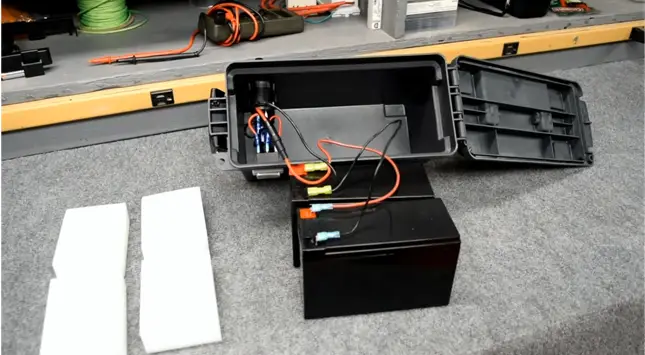Last Updated on May 3, 2023
As any RVer knows, a battery is essential for powering everything from lights to appliances. Batteries can be expensive, and they need to be properly protected in order to last.
So, do I need a battery box for my trailer? A battery box can shield your battery from the elements, protecting it from damage and extending its life. It helps to keep you safe by containing dangerous charges.
If you’re looking for a way to protect your investment and ensure that your RV is always ready to go, then an RV battery box is a must-have.
In this post, we’ll cover everything you need to know about RV battery boxes, from how they work to what features to look for. By the end, you’ll be able to decide for yourself whether a battery box is right for you.
Why I Need a Battery Box for My Trailer?
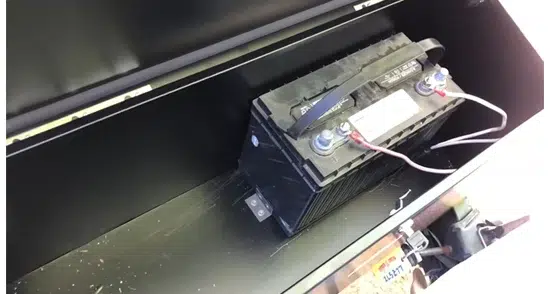
When it comes to choosing a battery box for an RV, there are a few things you should keep in mind. Here are a few tips to help you make the best decision for your needs.
Corrosion-Resistant
When shopping for an RV battery box, it’s important to consider one that is corrosion-resistant. This is especially important in areas with high humidity levels, as corrosion can lead to expensive repairs down the road.
There are a few different materials that can be used to make a battery box more resistant to corrosion, including aluminum and stainless steel.
If you’re not sure which material is best for your needs, it’s always a good idea to consult with a salesperson or expert before making your purchase. With a little research, you can find the perfect camper van battery box for your needs.
UV Protection
Exposure to the sun can quickly damage and degrade the battery, making it less effective and shorter-lived. To protect your battery from the sun’s harmful rays, you’ll need a UV-protected RV battery box.
These boxes are made of durable materials that block out the UV rays, keeping your battery safe and prolonging its life. They help keep the battery cool, which further reduces the risk of damage.
Whether you’re storing your RV battery during the off-season or using it on a daily basis, a UV-protected battery box is an absolutely necessary piece of equipment.
Resistance to Acids
Acids are some of the most corrosive substances on Earth, and they can cause serious damage to metal surfaces. That’s why it’s important to choose a material that is resistant to acids when constructing an RV battery box.
Stainless steel is a good choice for this application, as it is highly resistant to corrosion from acids. It is easy to clean and maintain, which is important in preventing the build-up of harmful acids on the surface of the lead acid battery box.
By choosing battery acid-resistant materials, you can be certain your battery box will withstand the test of time.
Defensibility to Oil
Oils can cause big problems for your RV battery box, including decreased performance and shortened lifespan. Many brands of battery boxes claim to be resistant to oils, but in reality, only a few are truly effective.
When testing for resistance to oils, it’s important to use a high-quality oil like motor oil, cooking oil, or baby oil. Apply a small amount of oil to a section of the battery box, and then observe how well it repels the oil.
The best battery boxes will completely repel the oil, while the lower-quality options will allow the oil to seep in and cause damage. Investing in a high-quality RV battery box with good resistance to oils will help secure protection for your RV battery lasts for years to come.
Temperature Resistance
Some are designed for cold weather use, while others are better suited for hot weather conditions. In selecting a battery box, it is important to consider the climate in which it will be used.
If you live in an area with extreme temperatures, then you will need a box that can withstand both the cold and the heat.
For warmer climates, you may be able to get away with a less durable box. Therefore, the type of battery box you choose should be based on your specific needs and location.
How Does a Battery Box Protect a Trailer
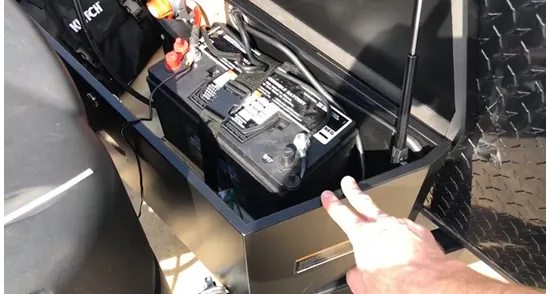
Battery boxes are an essential component of any trailer, providing a safe and secure storage location for batteries. This sturdy container helps to protect batteries from damage caused by vibration, bumps, and other potential hazards.
It helps to keep batteries dry and free from corrosion, ensuring optimal performance and longevity. By keeping batteries securely housed in a battery box, you can rest assured that your trailer will be able to power all of your essential accessories and electronics.
When shopping for a battery box, be sure to choose a model that is specifically designed for use with trailers. This will ensure that the box is properly sized and able to handle the stresses of the road.
Types of RV Battery Boxes
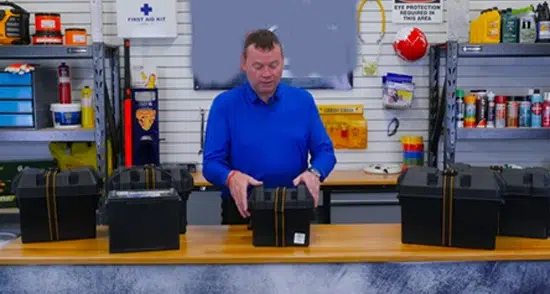
There are several different battery boxes for RVs available on the market, each with its own set of benefits and drawbacks.
Below, we’ll take a look at the most common types of RV battery boxes and discuss what to look for when shopping for one. Hopefully, this will help you decide which type of battery box you need.
Metal Battery Box for trailer
Metal battery boxes are the most common type of RV battery box. These are typically fairly affordable and are available in a variety of sizes to fit different types of batteries. They also offer good protection from the elements, helping to keep your battery safe and dry.
These boxes are typically made from aluminum or steel, and they can be either portable or permanently mounted. Following is a more in-depth discussion of them:
Steel Battery Boxes
If you want a safe and durable way to store your RV batteries, then you should consider the Steel RV Battery Box. This box is constructed from heavy-duty steel and is designed to withstand harsh road conditions.
The box is also powder-coated to resist corrosion and features a lockable lid to keep your batteries secure. Most Steel Boxes include a built-in charging port so that you can easily charge your batteries while on the go.
These boxes are the heaviest and most expensive option, but they’re also the most durable. If you plan on keeping your RV for a long time, a steel battery box may be the best choice.
Aluminum RV battery box
RV battery boxes made of aluminum are a popular option for many campers and travelers, as they offer a number of advantages over other types of battery boxes.
These boxes are lightweight and easy to transport, making them a great option for campers who need to save space. They’re also highly durable, meaning they can withstand the rigors of travel and camping.
These boxes provide excellent protection for your batteries, keeping them out of harm’s way and ensuring a long lifespan. When it comes to a high-quality, durable, and easy-to-use battery box, an aluminum battery box is a great option.
Plastic RV Battery Box
The Plastic Battery Storage Box is a popular choice for many RVers. It is lightweight, durable, and easy to install. It is an excellent way for batteries to remain organized and protected from the elements.
One of the main advantages of a plastic RV battery box is that it is weatherproof. This means that your batteries will be protected from rain and snow.
Another great benefit of plastic battery boxes is that they are easy to clean. Simply wipe down the inside of the box with a damp cloth to remove any dirt or debris.
Overall, the Plastic Battery Box is an excellent choice for anyone who wants an easy way to keep their batteries organized and protected.
These boxes are less expensive than aluminum models, but they can be more prone to breaking or cracking. If you’re careful with your RV, a plastic battery box can provide years of service.
Vented Battery Box
In an RV, the vented battery box is a valuable tool for keeping batteries charged and working properly. By keeping them vented, you are allowing fresh air to circulate around the batteries, which helps to prevent them from sulfating hydrogen gas.
Sulfation is when lead sulfate crystals build up on the lead plates in the battery, and it can decrease the battery’s capacity and shorten its life.
Venting the battery box helps to keep the batteries cooler, which also helps to extend their life. By keeping your batteries in a vented battery box, you are helping to ensure that they will last longer and provide you with reliable power.
Power Armor Battery Box
Armor battery boxes are an excellent way to keep batteries safe and secure. They are available in multiple sizes, so you can choose the one that best fits your needs. The boxes have a secure compartment for storing up to five batteries, various gear, or other equipment.
They are also great for keeping your equipment safe from the elements. The boxes are made of tough, weather-resistant materials, and they have a built-in locking system.
So, whether you’re searching for a safe place to store your batteries or just want to keep your gear protected, the PowerArmor battery boxes are a great option.
RV Double Battery box
A double battery box can help to alleviate many problems by providing a second source of power. The box is typically installed near the front of the camper and connects to the engine’s battery.
This way, if the main battery fails, the second battery can take over and provide power for essential items like lights and the furnace.
Most boxes include a voltage regulator to prevent overcharging, as well as an automatic shut-off switch that kicks in if the batteries are completely drained. By investing in a double or dual battery box, RVers can rest assured that they’ll never be left in the dark.
There are boxes for various types of batteries, such as the deep cycle battery, lithium battery, AGM battery, and marine battery box, which are also available.
But all of them can be related to the type of battery box described above. Battery charger ports are located on most travel trailer battery boxes, making them very convenient.
FAQs
It’s important to know the answers to some common questions about battery boxes. Here are the most frequently asked questions about RV battery boxes, along with the answers.
Does an RV battery box need ventilation?
The answer, fortunately, is fairly simple: while ventilation is not strictly necessary, it’s still a good idea to include some sort of ventilation in your design. The main reason for this is that batteries release small amounts of gas as they charge and discharge.
This gas can build up inside the battery box, potentially leading to dangerous conditions. By including vents in your design, you can help ensure that any gases are released into the atmosphere, keeping your RV safe and comfortable.
Are Battery Boxes Safe?
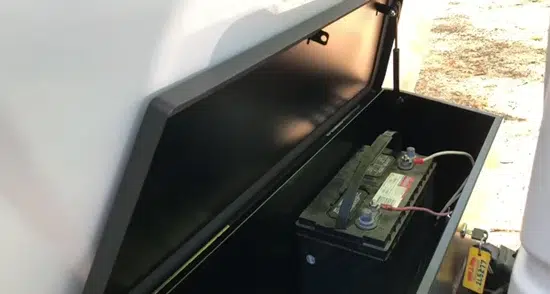
RV battery boxes are generally safe, although they might lack some extra features for rougher use. The main purpose of an RV battery box is to protect the battery from damage and the environment from acid leaks.
Most RV battery storage boxes are made of sturdy plastic or metal, and they typically have a lid that seals shut to keep out moisture and dirt.
Some battery boxes also have a built-in vent to allow air to circulate and prevent the buildup of dangerous gases. While battery boxes are not indestructible, they are typically tough enough to withstand the bumps and vibrations of everyday life on the road.
Can you parallel battery boxes?
If you have two RV batteries that are the same voltage, you can use a battery paralleling kit to connect them together. This will allow both batteries to be used as one, giving you twice the power. It is vital to note that the two batteries must be of the same voltage in order to be connected in this way.
Otherwise, you could damage your electrical system. You should also invest in a good quality charger that can charge both batteries at the same time. By taking these steps, you will assure that your RV always has enough power to meet your needs.
Last Thoughts
So, the answer to “do I need a battery box for my trailer” depends on your needs. While a battery box is not required for every trailer, it is a good idea to have one if your trailer will be exposed to the elements. A battery box helps to protect your batteries from the elements, as well as keep them organized and safe.
By taking all the factors outlined in this post, we hope you will be able to make an informed decision about whether or not you should get a battery box for your trailer. And last but not least, do you have any questions about battery boxes that we didn’t cover? Let us know in the comments below.

